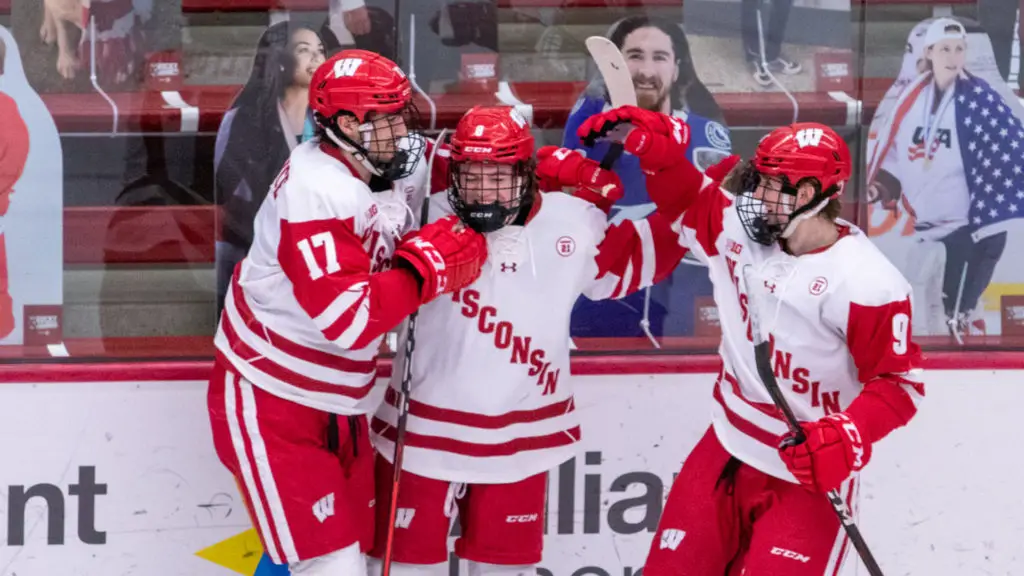
Bridgeport Regional, March 26-27
Webster Bank Arena, Bridgeport, Conn.
Friday, March 26, 1 p.m. Eastern time, ESPN2/WatchESPN
No. 1 Wisconsin (20-9-1) vs. No. 4 Bemidji State (15-9-3)
Friday, March 26, 6:30 p.m. Eastern time, ESPNU/WatchESPN
No. 2 Massachusetts (16-5-4) vs. No. 3 Lake Superior State (19-6-3)
Saturday, March 27, 5 p.m. Eastern time, ESPNU/WatchESPN
Bridgeport Regional Championship
BEMIDJI STATE
Season record: 15-9-3 (8-5-1, 4th in WCHA)
Playoffs to this point: Beat Michigan Tech in two games in WCHA quarterfinals before losing to Lake Superior State 5-1 in WCHA semifinal game
Top players: junior forward Alex Ierullo (7-16-23); senior forward Brendan Harris (8-12-20); senior forward Ethan Somoza (13-5-18); freshman forward Lukas Sillinger (6-9-15); junior forward Owen Sillinger (9-5-14); sophomore defender Elias Rosen (4-10-14)
Top goalie: senior Zach Driscoll (14-9-3, 2.27 GAA, .924 SV%)
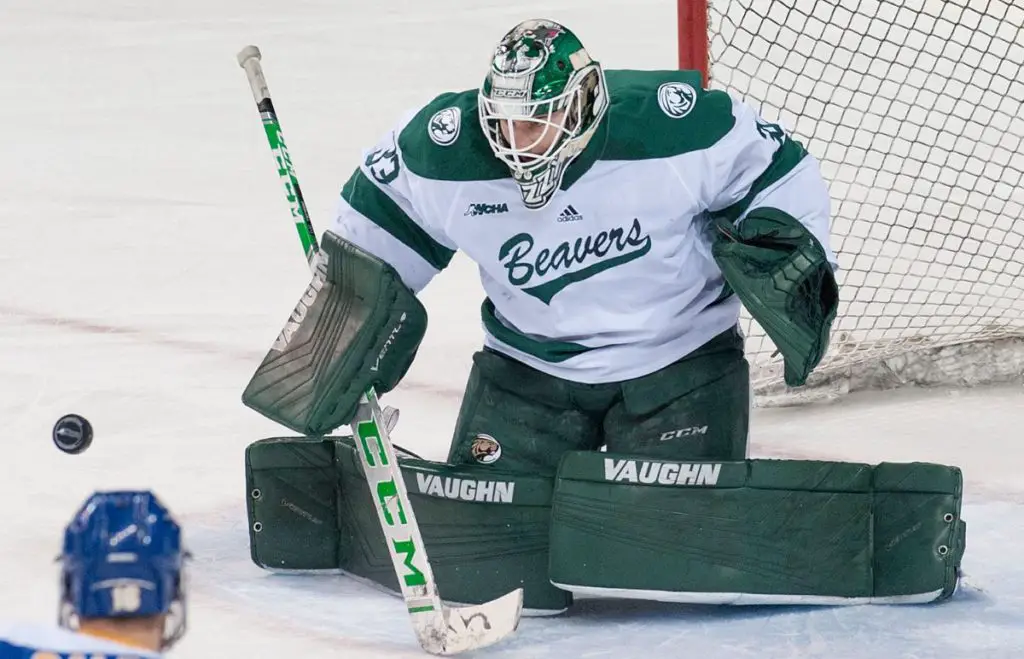
Why they will advance to Pittsburgh: Just to prepare you for a discussion you’re going to hear a lot during Friday afternoon’s broadcast, I will remind you of four numbers: 2009.
Bemidji State was also a No. 4 seed during the 2009 tournament. Remember them? The Beavers beat No. 2 overall seed Notre Dame in the first round then toppled Cornell to make it to their first Frozen Four.
It only takes two wins to make it, and the Beavers have arguably an easier path this season — Wisconsin is good, but they are beatable, and a potential rematch with conference foe Lake Superior State (a team the Beavers beat twice this year) is possible in the regional final.
Also, the Beavers are arguably a much better team than the 2009 edition. They have pretty good scoring depth, but their defensive corps in front of Driscoll is also underrated.
Why they will not advance to Pittsburgh: If they can’t stop Cole Caufield, things might get dicey. The probably Hobey Baker winner has scored 28 goals in 30 games this season. No one else in the country is even close. The entire team has 115 — nearly 4 goals per game. If Wisconsin gets ahead early, I think it will be tough for the Beavers to hang with them goal-for goal.
At one point during Sunday night’s NCAA tournament selection show, the ESPN graphic misspelled “Bemidji.” (How many Wisconsin fans out there now think the Badgers are playing “Bimidji State”?)
Some coaches might get worked up about “disrespect,” but Tom Serratore took it in stride. He is not that kind of coach.
“You know what, at least it wasn’t ‘B-e-r-m-i-d-j-i’ like it usually is,” Serratore joked Monday. “Burr-midji.”
Serratore had every right to be in a good mood.
His team received its first NCAA tournament bid since 2010, and did so, ultimately, without drama. Despite needing to wait until the final bracket was revealed to confirm their appearance, the Beavers weren’t the last or even the second-to-last team in the tournament. They were comfortably in as the No. 13 overall team.
“We have a committee made up of hockey people and our body of work was strong,” Serratore said. “When I looked at our body of work and then looked at everyone else’s, I just said, ‘How can you not pick the Beavers?’ But I’m not going to sit here and say I wasn’t concerned (until the end).
“There was a couple teams that we thought we were going to be ahead of, which we ultimately ended up being ahead of, the way it played out, and you do think, what’s going on here. But it all played out the way we thought it was going to play out. We felt that where they had us is where we probably belong, and I think the committee did a heck of a job.”
That means the Beavers get a crack at the Big Ten champion Badgers and their high-octane offense which features presumptive Hobey Baker favorite Cole Caufield.
Serratore knows Caufield will be a handful.
“Obviously, he’s dangerous. You’re going to have to play close attention when he’s on the ice. He just has an uncanny way of getting open,” Serratore said. “We know how good he is and we know how good their hockey team is.
“Teams who are No. 1, they don’t just fall from the sky and become a No. 1. You know they’ve got depth, they’ve got high-end players, they’ve got a dangerous power play… they have a lot of different attributes.”
Still, the Beavers aren’t going to be daunted by bright lights and a No. 1 draft pick. Bemidji State’s schedule is always filled with top-ranked teams and explosive offenses. These are the kinds of games the Beavers seem to love to play. Being a No. 4 seed against a No. 1 seed isn’t much of a concern.
“Since 2008-09, there’s been a lot of four seeds who have won, and there’s been a lot of four seeds who have gone to the Frozen Four,” Serratore said. “So we’re excited to go compete and let it play out. I mean, it’s not like we haven’t played these teams before. Every year we play a tough schedule.”
Serratore noted that this season the Beavers played 21 games against teams with a .500 or better record.
“We had the strongest schedule in the country this year,” he said. “We’re battle tested and we’re ready to compete.”
— Jack Hittinger
LAKE SUPERIOR STATE
Season record: 19-6-3 (9-5-0 2nd in WCHA)
Playoffs to this point: Won the WCHA tournament (defeated Alabama Huntsville in the quarterfinals, defeated Bemidji State in the semifinals, defeated Northern Michigan in the title game)
Top players: junior forward Ashton Calder (15-13-28), junior forward Pete Veillette (13-13-26), sophomore forward Louis Boudon (8-11-19), senior forward Hampus Eriksson (6-13-19), senior defenseman Will Reidell (6-11-17)
Top goalie: senior Mareks Mitens (13-5-0, 1.85 GAA, .912 save percentage)
Why they will advance to Pittsburgh: The Lakers’ top line of Ashton Calder, Pete Veillette and Louis Boudon have been the Lakers’ leaders all season offensively. Night in and night out, they have found ways to be leaders. Calder has size and speed. Veillette sees the ice very well and can find Calder with speed. Boudon just plays a strong all-around game. They proved effective in all three zones Saturday in a win over Northern Michigan to win the WCHA playoff title.
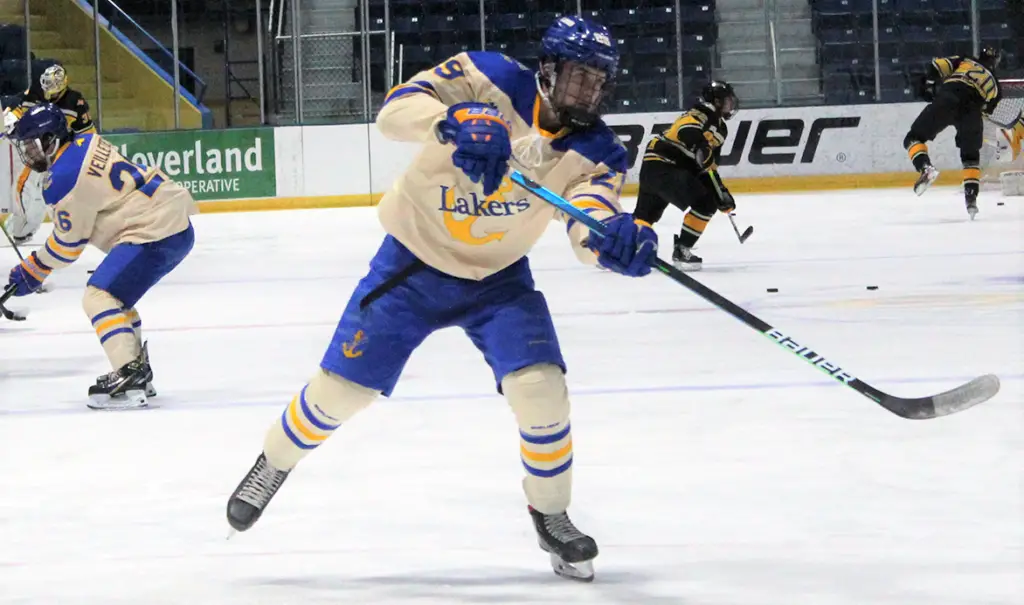
Why they will not advance to Pittsburgh: Inexperience in the national tournament.
The Lakers have not been to the NCAA tournament since 1995-96, or back when Jeff Jackson was the head coach.
“My office overlooks the rink, and every day I look out at many banners,” said LSSU coach Damon Whitten. “That’s the expectation. It’s been a long time, but we still have fans and alumni who know those championship days very well, and we want to get back to that level. We share that goal.”
For Whitten, a big part of the challenge has been to recruit the right types of players who can step in and help usher the tradition of Lake Superior State while also adding their own touches.
“I think it’s a really good challenge,” Whitten said. “When you’re recruiting with that history, and that tradition, that’s big. You can come to Lake State (and) win a national championship, win a league championship.
“We’ve got an unbelievable history of putting guys in the NHL, certainly a lot of distinguished alumni in other fields as well. But when you look at the hockey side of it, that’s all a really positive thing to use. I think it’d be challenging with some of the perception of fans or people who have been around in those championship years.
“They get a little spoiled, and they want it every year, expect it that way. So, there’s a challenge there, but I think that’s a really positive thing to have. That versus the other side, where you lack history, lack tradition, I will take this nine times out of 10.”
The Lakers have been through a lot over the last three seasons, trying to get to this point. They won 23 games two seasons ago before taking a step back last season. Whitten feels that his upperclassmen learned a very valuable lesson over that stretch, but there is still a lot his team needs to learn as they move forward.
— Daver Karnosky
MASSACHUSETTS
Season record: 16-5-4 (13-5-4 Hockey East, third)
Playoffs to this point: Defeated Northeastern 4-1, in Hockey East quarterfinals, defeated Providence 5-2, semifinals, defeated UMass Lowell 1-0 in championship game
Top players: Forward Bobby Trivigno (10-20-30), forward Oliver Chao (4-17-21), forward Carson Gicewicz (13-7-20), forward Josh Lopina (8-12-20), defenseman Matthew Kessel (9-11-20)
Top goalies: Filip Lindberg (7-1-4, 1.48 GAA, .940 SV%), Matt Murray (9-4-0, 2.01 GAA, .913 SV%)
Why they will advance to Pittsburgh: This might be one of the deepest teams in the NCAA field.
They don’t rely on one forward or one line to score as all four lines are dangerous. Four of their six defensemen (Kessel, Zac Jones, Marc Del Gaizo and Colin Felix) could be the top defensemen on most teams. And though both goaltenders are high quality, Lindberg is healthy and carrying the water with a stingy goals against.
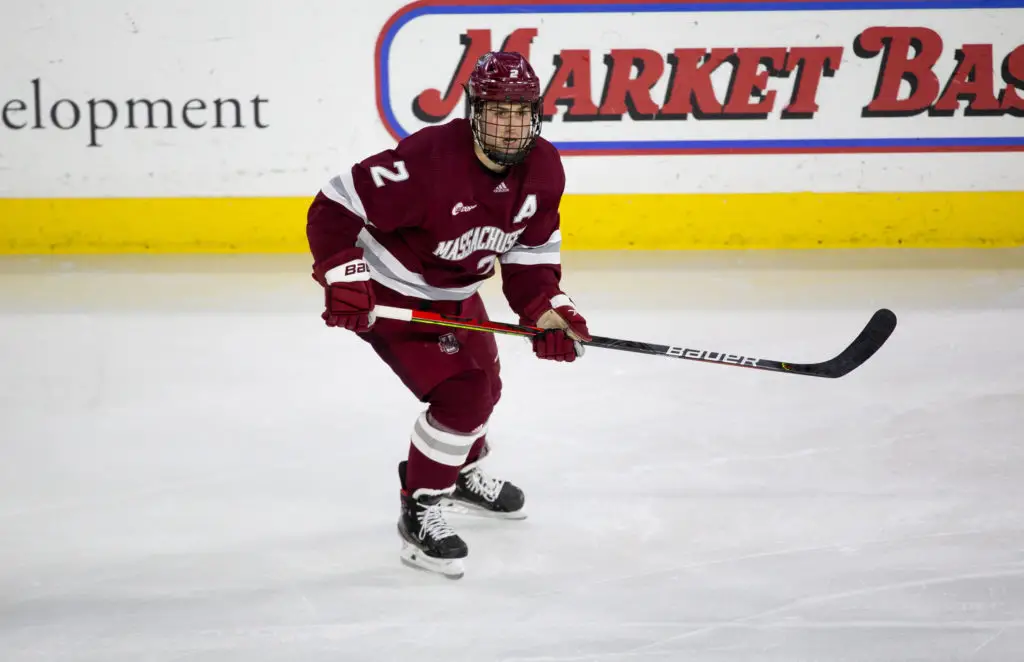
Why they will not advance to Pittsburgh: If teams can find a way to shut down the UMass offense, that could be a bump in the road for the Minutemen. They’re certainly confident but they haven’t competed against a team like Wisconsin and their potent offense this year. Should those two meet in the regional finals, that could derail this UMass team.
The last time the NCAA tournament was played, UMass was one of the final two teams standing, ultimately losing 3-0 to national champion Minnesota Duluth.
That night, though, was so unfamiliar to the Minutemen. Not just the players, but the coaching staff. Coach Greg Carvel, though, isn’t the only one teaching his players how to prepare this time. The junior and senior classes have no problem passing along the knowledge this team gained in the 2019 NCAA tournament run.
“The last time we went through the whole NCAA championship, we had zero experience and it really showed in the championship game,” said Carvel. “We watched [defending champion Minnesota] Duluth do everything right. That had obviously been there. We were just going where we were told to go instead of doing what we thought we should be doing.
“Knowing how we played the last time we were in the NCAAs, those [upperclassmen] are preaching to the how we needed to elevate our game and how we’re going to elevate again. That will be critical.”
In a way, UMass has already shown that they’ve grown. Two years ago, the Minutemen fell short in the Hockey East tournament despite being the prohibitive favorite. This season, as the third seed, UMass marched through the tournament with surgical precision, taking advantage of opponent’s mistake, playing solid defense and, ultimately, hoisting the Lamoriello Trophy last Saturday night.
“I really like the way our teams play throughout the playoffs,” said Carvel. It was really good defensive hockey.”
That defense is becoming the staple of this team (“it’s the defense and special teams that have led our team this year,” said Carvel). And while the back end is strong and stingy, you have two blueliners in Matthew Kessel and Zac Jones who are among the top four goals scorers on the team.
Up front, Bobby Trivingo is having an elite season. He was somehow overlooked as a Hobey Baker finalist but did earn the Walter Brown Award, college hockey’s oldest award, presented to the top American born player in New England.
Trivigno’s season to date is a bit of a bounceback after scoring 28 points (13 goals) in 39 games as a rookie, his production dipped a year ago (nine goal, 20 points in 34 games). Carvel challenged Trivingo to work harder and get stronger, despite his diminutive 5-foot-8 frame.
It paid off.
With 30 points in 25 games, including 10 goals, is 10th nationally in total point and points per game.
Carvel looks forward to a regional with two WCHA teams his team rarely sees as well as a Wisconsin club that could set up a monster matchup in the regional final, should both teams advance.
Before that point, though, Carvel has a job to get his team off of cloud nine after capturing the program’s first Hockey East title.
“I’ll ground them this week,” said Carvel. “We beat BC a few weeks ago and then we lost in a shootout to Maine. I learned a lesson. I don’t care if the players did, I learned a lesson.
“It’s very similar. You win the championship, you get a little too high. If you don’t get back under soon, you’re going to pay for it.
“Believe me, I’ve got a plan to ground them and when we ground them, they’re a good team.”
— Jim Connelly
WISCONSIN
Season record: 20-9-1 (17-6-1-0 Big Ten, first)
Playoffs to this point: Beat Penn State in B1G semifinal, lost to Minnesota in the Big Ten championship game
Top players: Forwards Cole Caufield (28-21—49), Linus Weissbach (11-29—40), Dylan Holloway (11-23—24), Ty Pelton-Byce (12-17—29); defenseman Josh Ess (2-5—7)
Top goalies: Robbie Beydoun (11-7-0, 2.54 GAA, .922 SV%), Cameron Rowe (9-2-1, 2.02 GAA, .934 SV%)
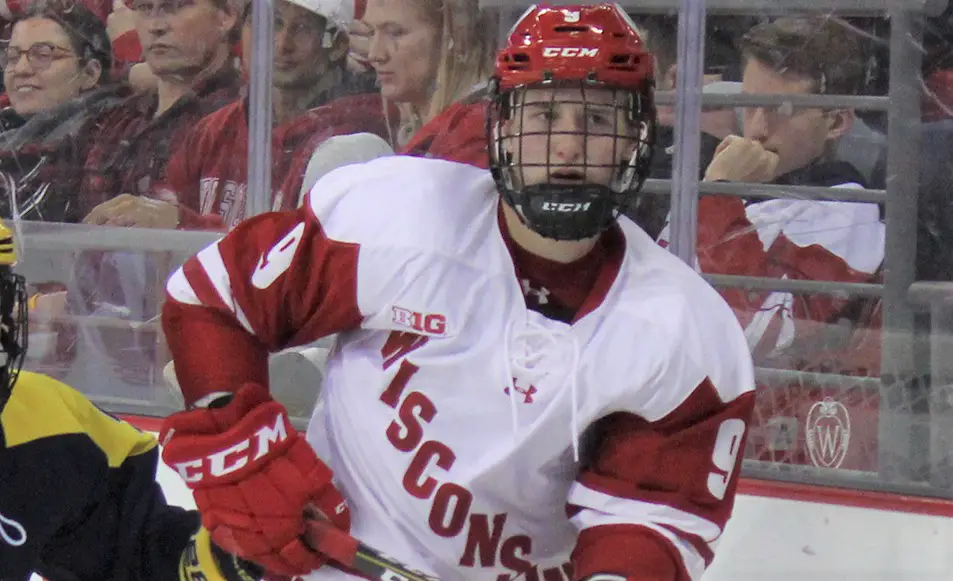
Why they will advance to Pittsburgh: The Badgers have an outrageously talented offense led by the top scorer in the nation, Cole Caufield. It would be an overstatement to say that Caufield is the only reason for Wisconsin’s success, but it is also impossible to overestimate his value to the Badgers. He elevates the play of everyone on the team and he’s nearly impossible to keep in check.
Why they will not advance to Pittsburgh: Wisconsin’s one weakness is inconsistency, especially defensively. The Badgers know they can score and are, therefore, a little looser sometimes than they should be in other areas of the game. Wisconsin’s goaltending duo is good, but the Badgers have occasional lapses in team defense.
After chasing Minnesota in the Big Ten standings all season, the Badgers edged out the Golden Gophers for their first regular-season conference championship since 2000, when they last captured the WCHA title. Then they faced off against Minnesota in this year’s Big Ten playoff championship game and found themselves chasing the Gophers once again.
Down 2-1 in the second period of that game, the Badgers saw the Gophers explode for three goals within a three-minute span in the second half of the period. In spite of scoring three goals themselves in the third, the Badgers lost that game 6-4. It still stings.
“The loss against Minnesota was disappointing,” said coach Tony Granato. “We really wanted to win a second trophy and win the Big Ten playoffs. Minnesota was great that night and they deserved to beat us. We had a little bit of a hiccup there in the second period that cost us a game, but you saw how we played in the third period to come close. We had them off-balance there for the whole period and almost came back and put ourselves in a position to win that game.
“That’s been our fight all year.”
After going 5-5-0 in their first 10 games of the season, the Badgers have had few hiccups since Jan. 1, amassing 16 wins with no back-to-back losses since the start of the calendar year.
“Our goal at the start of the year was to get to this tournament,” said Granato. “Our goal was to continue to get better as a team, to pull together as a team as the year went along. We’ve accomplished that, so I think we’re set up for success based on how we played all year.”
Twice in the early part of the season, the Badgers had to pause for COVID protocols, once before competition began and then again in early December. Wisconsin was also without several marquee players for the IIHF World Junior Championship.
With his entire squad at his disposal, Granato’s team improved steadily in the second half and the Badgers may be peaking right now – thanks, said Granato, to the tough competition Wisconsin has faced in the Big Ten.
“In our conference, all of these games have helped us get ready for this opportunity,” said Granato. “All we’ve done this year and the places that we’ve gone and the challenges that we’ve had, we’ve answered the bell.”
Granato said that he knows that Wisconsin’s first opponent, Bemidji State, is physical and can “grind it out pretty good,” but that the Badgers are approaching the weekend as they do as they have all season.
“We try to not sit back and watch,” said Granato. “We try to get on the attack and make them have to defend us, so we’ll have that same mentality.”
— Paula C. Weston

